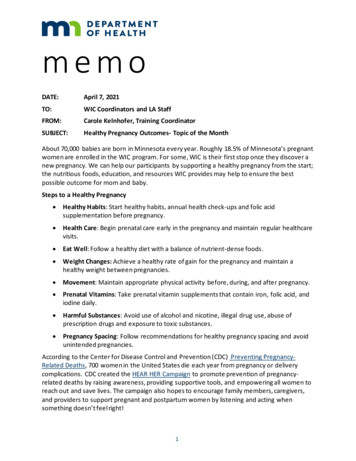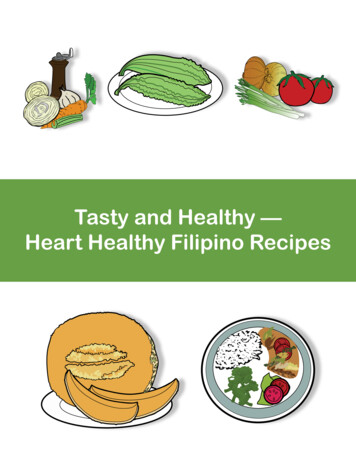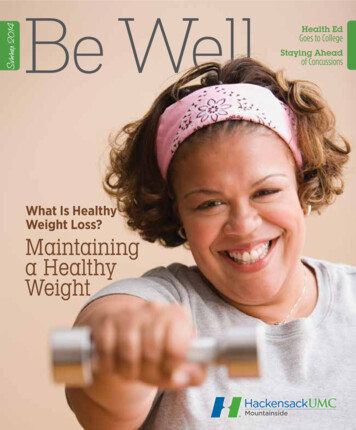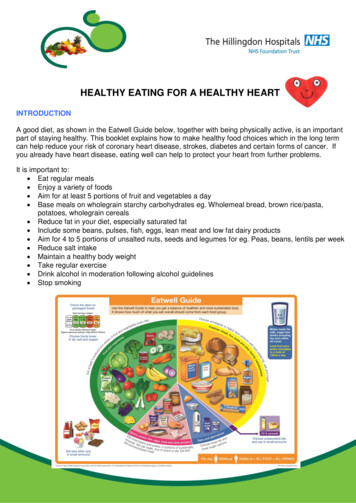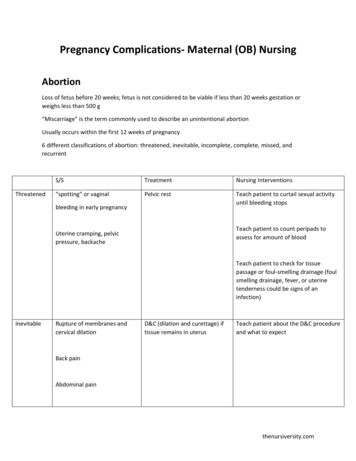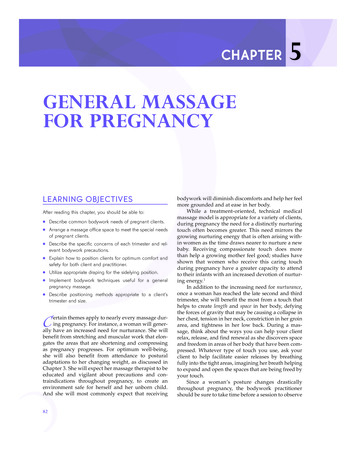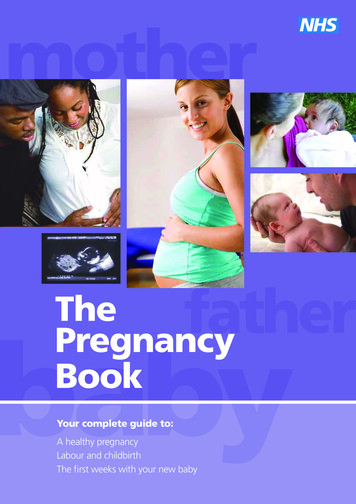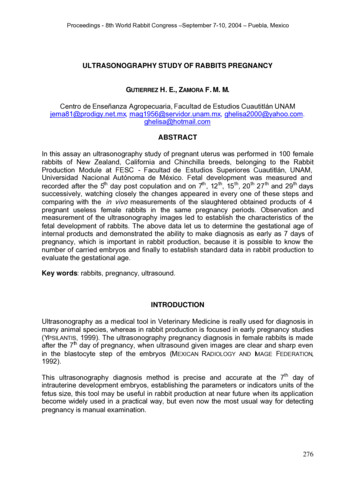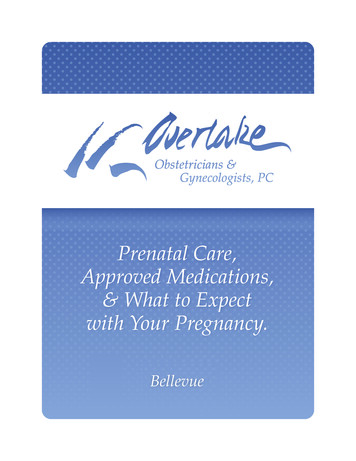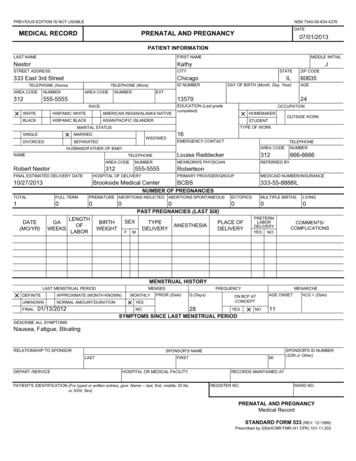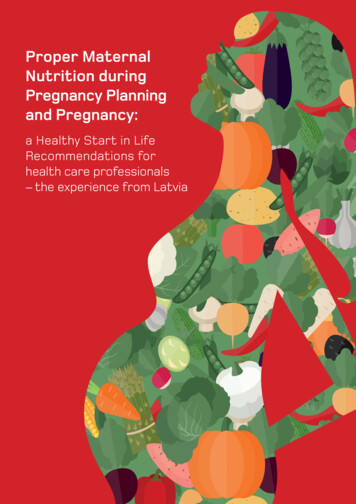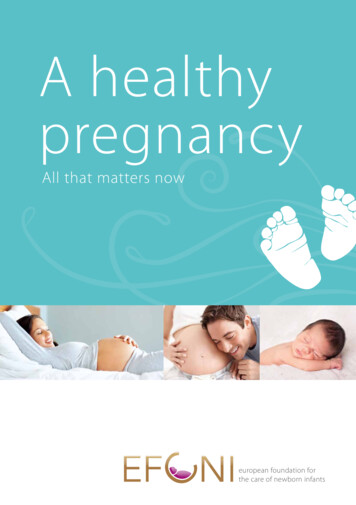
Transcription
A healthypregnancyAll that matters noweuropean foundation forthe care of newborn infants
For the sake of readability, masculine and feminine grammatical genders will not be used in combination in therest of this document. All personal pronouns apply to both genders.This brochure is intended to be a guide but cannot and should not be a substitute for in-depth discussion withyour doctor or midwife. Please make a note of any questions you may have on the subjects covered in thisbrochure for your doctor or midwife to answer at your next visit.Dear Parents-To-BeContentsExpecting a baby is a wonderful experience. Look forward to the coming months and the newlife with your baby! A time full of life-enhancing changes lies in front of you.Pregnancy. 4This guide contains the main facts you need to know on the subject of pregnancy. It is notintended to be a comprehensive childbirth manual and is no substitute for the advice of an experienced midwife or doctor. However, we hope it will give you an idea of the most importantaspects and will help you to enjoy a healthy and happy pregnancy. This guide will also be useful if you are planning a pregnancy. With the knowledge and options available today, you canhelp give your baby everything needed for a good start in life even before your baby is born.How to give your newborn baby a good start in life . 8We would like to thank Bübchen, Nestlé and Thermo Fisher Scientific for their commitmentand support in the production of this brochure.Smoking and passive smoking during pregnancy . 20We wish you an exciting, carefree and – the most important thing of all – a healthy pregnancyand hope that you will find lots of useful and helpful advice as you browse through this guide.Infectious diseases . 26Silke MaderChronic diseases . 32The first 1000 days – the lifetime impact of a healthy diet . 7Eating for health . 10Physiological skin changes during pregnancy . 15Medicines during pregnancy . 17Alcohol and drugs during pregnancy . 19The pelvic floor during pregnancy and childbirth . 24Gestational diabetes . 28Pre-eclampsia . 34Planning a baby? Newly pregnant? You probably have lots of questions in this new situation. Thisguide contains important information to get you started and may have the answers to a numberof your questions.PD Dr Dietmar SchlembachHead of Obstetrics Department, Vivantes Klinikum Neukölln, Berlin, GermanyPrenatal diagnostic testing . 38A couple becomes a family . 41When life doesn‘t go as planned . 44I won‘t be coming alone! Multiple pregnancies . 46All ready for birth! . 47We know today that our lifestyle, environment and other factors influence the outcome of a pregnancy. This brochure explains many of those influences. Find out what can help you to do the bestfor your child and for yourself.Here at last! – the birth . 48Breastfeeding . 55Prof. Dr Kypros Herodotou NicolaidesUseful addresses and information . 57Director of the Fetal Medicine Foundation, Professor of Fetal Medicine, King’s College and University, UKThe editors . 60The authors .6123
PregnancyStephanie PolusA little miracle in the making – in your body!What happens during the months of pregnancy?How the little miracle comes about never loses its fascination. It starts out very, very small. Afterconception, the fertilized egg travels down the fallopian tube and implants itself in your uterus.This takes about five to ten days. In the uterus, the ball of cells divides into the placenta andthe embryo, which is tiny at first – smaller even than a pinhead. The placenta keeps the babysupplied with nutrients during the pregnancy. It also starts producing hormones immediatelyto prepare your body for pregnancy. You may have already noticed some of the typical signs ofpregnancy: nausea, flatulence and digestive problems, changes in your sense of taste (perhapsa metallic taste in your mouth), a tugging sensation in your pelvis, sensitivity to odours, tenderbreasts, and feeling tiredness. These symptoms differ in severity from woman to woman butfortunately stop within three months in most cases.The length of your pregnancy is calculated from the first day of your last menstrual period. Thisadds up to nine calendar months (30 or 31 days each) or 40 weeks of pregnancy. Pregnanciesare often divided into three-month periods (trimesters).A new human being comes into existence and continues to develop and grow over the forthcoming months to become a new person – your baby.Morning sickness?Occurring mainly in the mornings but sometimes lasting all day, nausea may cause somediscomfort during the first couple of months. The best advice is to have something smallto eat before leaving your bed. How about having your partner bring you freshly brewedginger tea and a piece of toast or a rusk in bed? You may also want to have several smallmeals spread throughout the day rather than a few large ones.4 – 7 weeks of pregnancyThe embryo‘s heart starts beating roughly as early as about fourth weeks of pregnancy. The tinycreature inside you is making enormous strides in development during the first two months.The brain cells and nervous system are developing at an incredible pace. At the end of the second month, your baby is about three centimetres long and eyes and ears have already startedto develop. Slight bulges indicate where arms and legs will grow.8 – 11 weeks of pregnancyThe growth of your baby s arms, legs, nose, mouth, ears and the brain develop at a speedyrate. The changes in your own body are doing great things too. You are producing up to twiceas much blood to keep your baby well supplied. Pregnancy changes the metabolism (biochemical and hormonal reactions in the body that keep the organs and cells working in optimalorder) and circulation of the female body. Be sure to drink at least two litres per day. This andthe gradually increasing pressure of the growing uterus on your bladder means you have tourinate more frequently.12 – 15 weeks of pregnancyDuring this time, your baby’s brain starts controlling movements and reflexes. Your baby is nowable to move voluntarily. Your baby continues to grow at a rapid pace and can swallow andsuck their thumbs. Your stomach starts to show and any morning sickness prevails. You feelmore stable and able to look forward to what lies ahead.16 – 19 weeks of pregnancyPlease attend all your scheduled prenatal appointments. Doing so will give you peace ofmind about your health and your baby‘s well-being.4Do you ever notice a fluttering sensation in your stomach? It might be your baby movingabout! Your baby can hear you and the things going on around you. If you find you are sweating more and need to take a breather every now and then, it‘s normal. Your body temperatureis slightly raised because of the changes in your hormones.5
The first 1000 days – the lifetimeimpact of a healthy diet20 – 23 weeks of pregnancyYour baby is quite the acrobat these days, moving about so much that the kicking is visiblefrom the outside and not just perceptible to you. The baby‘s father can participate more in thepregnancy and communicate with his child. Slight, regular lurching sensations reveal that yourbaby has hiccups.24 – 27 weeks of pregnancyDuring a child‘s first 1000 days – from conception until about twoyears of age – it grows and develops at an amazing pace and is heavily influenced by environmental factors. The nutrition babies receivebefore and after birth, affects their health. The latest research data increasingly shows the importance of a balanced diet for the mother-to-be,breastfeeding mother and baby to keep the child healthy – in babyhood and beyond.Your child‘s facial features start forming. By the end of the seventh month, your little one canopen the eyes and distinguish between light and dark. Your baby is putting on weight andyou notice the effects of that, too. From 26 weeks of pregnancy, you may be gaining 0.5 to 1kilogramme (1.1 – 2.2 lbs) per week. Things start to become more of a burden. The additionalweight puts a strain on your back and legs, your organs are getting squeezed and you haveless freedom of movement.28 – 31 weeks of pregnancyYour baby‘s memory develops during this period and already recognizes your voice. Yourbaby’s sense of taste develops, being able to taste the slight sweetness of the amniotic fluid,which is similar to the sweetness of your breast milk. Your uterus is getting crowded as yourbaby grows. And your baby needs to rest more– just like you.The first 1000 days270 dayspregnant 365 days1st year 365 days2nd year32 – 40 weeks of pregnancyIn the final two months, your body gets into gear for the birth. Your baby drops down into thepelvis during the final weeks of pregnancy with the head facing downward to get into theright position for delivery. You will notice this from the tugging sensation in your back and caneven see it from the lowering of your stomach. Don‘t forget to pack a bag for the hospital fourweeks before your due date so that everything is ready when you go into labour.677
How to give your newborn baby a goodstart in lifeProf. Jörg DötschHealthy growth and prevention of obesity is a good example of an area influenced by habits formed before birth. Although many factors influence whether a child will become overweight orobese, one of the most important seems to be nutrient intake before and after birth.Newborns should be breastfed if at all possible. As well as promoting a close bond betweenmother and child, breastfeeding helps prevent certain health issues later in life both for thechild and for the mother.If the mother is overweight, the child may be overfed during the pregnancy and is then more likelyto become overweight or develop diabetes later in life.If – for whatever reason – you are not breastfeeding, don‘t worry: your healthcare professionalwill be happy to advise you on infant nutrition and a healthy way to raise your child. Your lovingcare promotes your baby‘s development and is just as important.If you are overweight, you should try to reduce your weight even before the pregnancyand switch to a lifestyle that includes more exercise and a healthy diet. It is also importantto keep weight gain during the pregnancy within limits. Ask your healthcare professionalabout this.Malnutrition of the baby in your womb may also cause complications for the child later on. Aone-sided, nutrient-poor diet on the part of the mother – due to an eating disorder or similar– is not the only possible reason for malnutrition in the baby. Certain conditions such as preeclampsia, kidney disease, or smoking and alcohol during pregnancy may prevent the babyfrom growing adequately in the mother‘s womb, resulting in a lighter and smaller baby. Ababy that doesn‘t receive enough nourishment in the womb learns to make do with less andmay not be able
adds up to nine calendar months (30 or 31 days each) or 40 weeks of pregnancy. Pregnancies are often divided into three-month periods (trimesters). 4 – 7 weeks of pregnancy The embryo‘s heart starts beating roughly as early as about fourth weeks of pregnancy. The tiny creature inside you is making enormous strides in development during the first two months. The brain cells and nervous .
